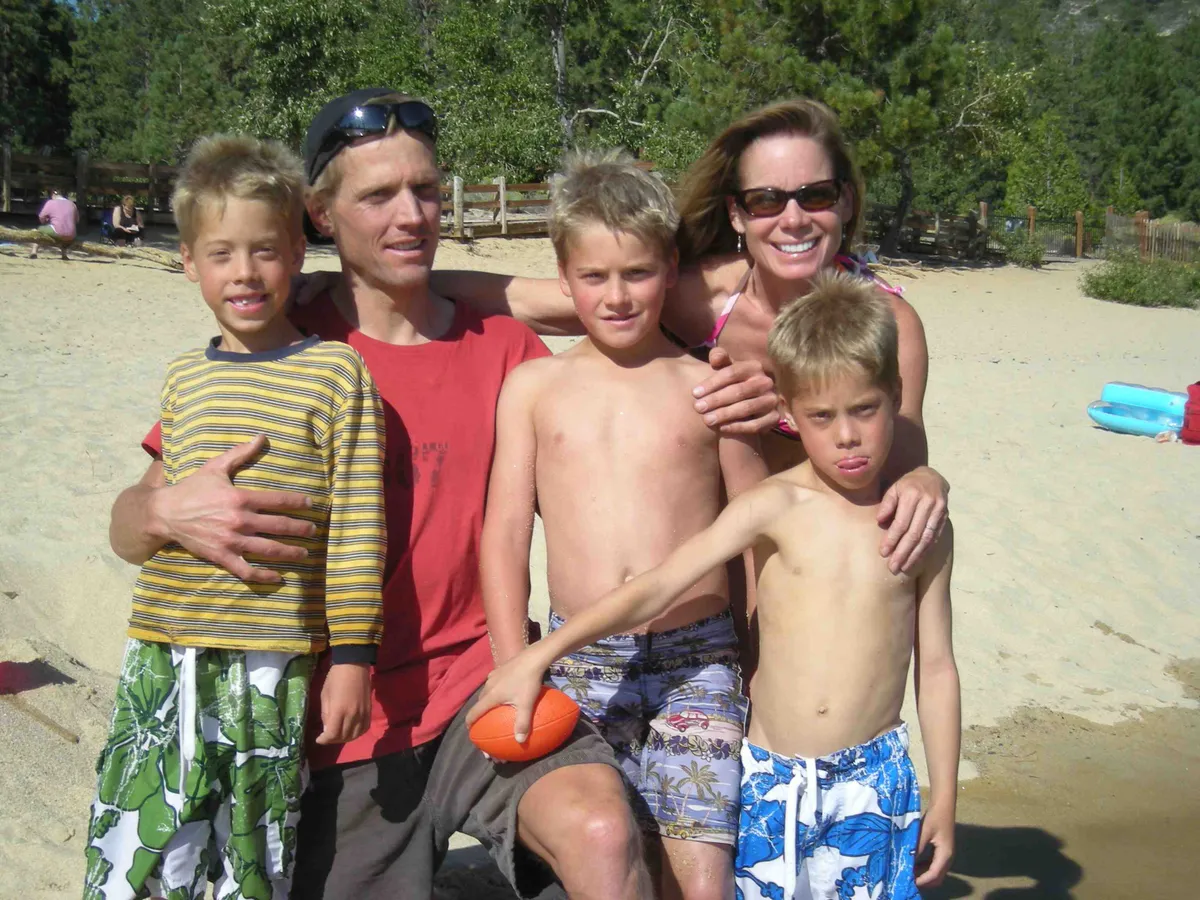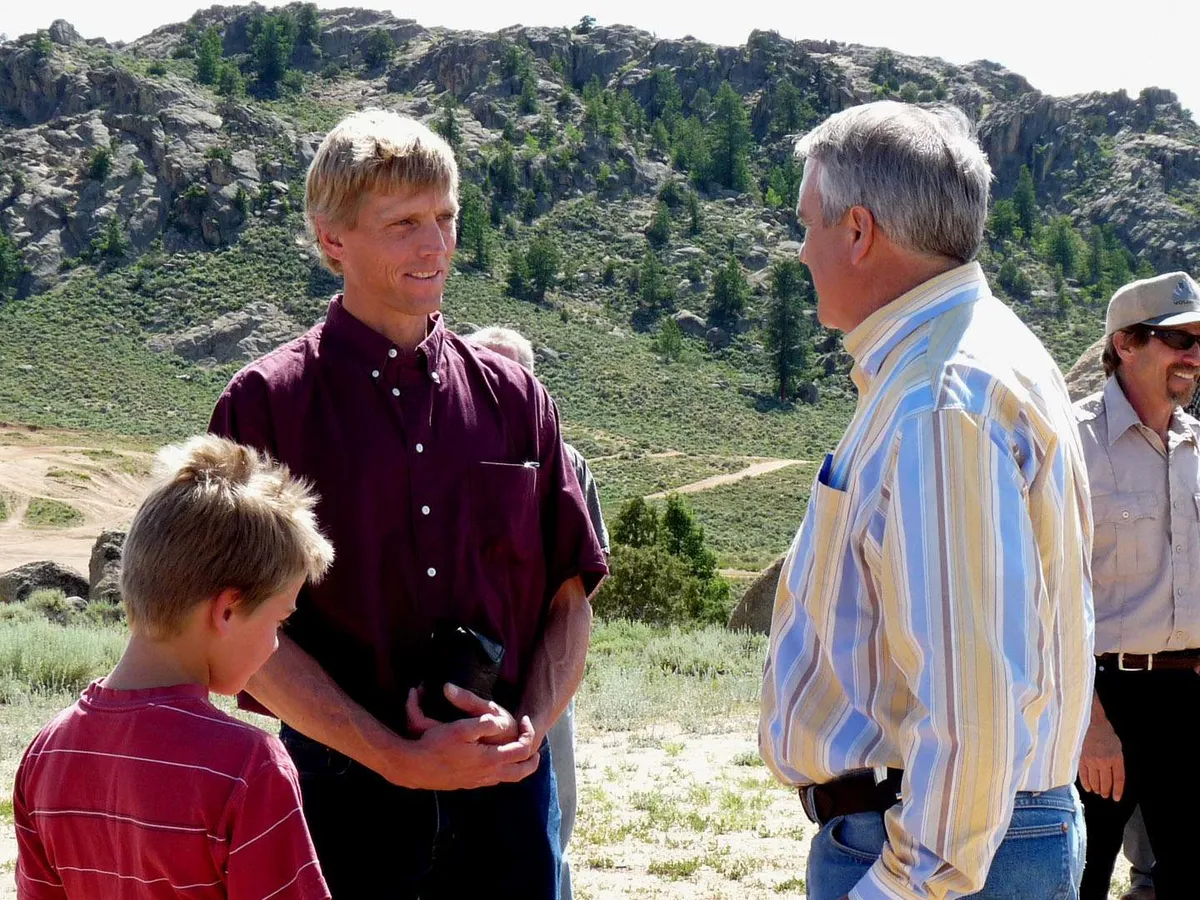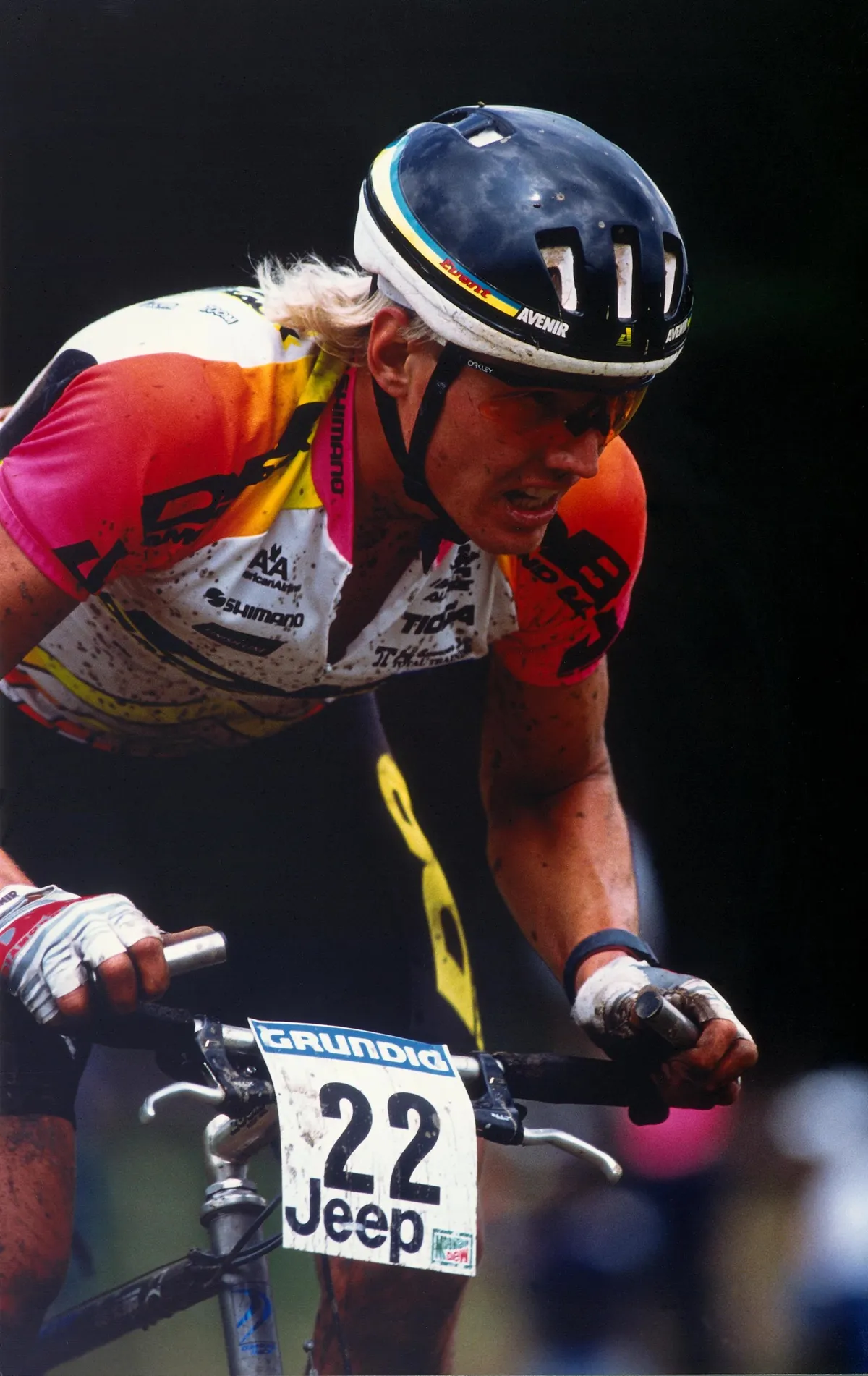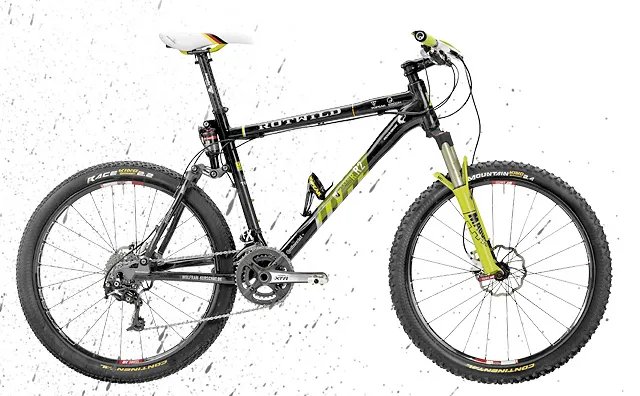Dave Wiens is the Colorado mountain bike racer who beat Floyd Landis and Lance Armstrong in the 2007 and 2008 Leadville 100 races, and his wife Susan DeMattei is no slouch on a bike either – her riding career peaked with a bronze medal at the 1996 Atlanta Olympics.
The couple now live in tiny Gunnison, Colorado with their sons Cooper, Ben and Sam. Wiens, 45, splits his time between family, trail development, bike advocacy and coaching sports with his sons, while DeMattei, 47, is a part-time nurse at the local hospital. BikeRadar spoke to the pair about life after professional racing
BikeRadar: Dave, you've won the Leadville 100 six times now – will you be racing it in 2010?
Dave: I will, but I'm taking the race preparation differently. Racing against Floyd Landis in 2007, then Lance in 2008 and 2009 was fun. For me, Leadville has always been about the preparation; these last three years, the added competition has bumped it up a few notches. I think I'm over that now. I still want to race the event like I was in 2005, 2006, where I went into it with the fitness I had.
I don't want to have any constraints with Susan and the boys leading up to the race, and I won't pass up some camping or rock climbing with the family in the weeks leading up to the race. I also think the 2010 race will have a whole new dynamic, with a very competitive field. As a 45-year-old, it may not be realistic with some of the newer guys coming in. You never know; I'm still competitive, and enjoy riding at the front!
What did you think of Race Across the Sky, the Leadville documentary?
Dave: I liked it; they did a great job showing the heart and soul of the race, and paying attention to the people involved. Obviously Lance was a big factor, but including other people's stories was excellent. They captured the breadth of the event. Now people have a true visual of the event, even my relatives who've heard of it but hadn't attended. I've heard positive feedback from several people. It could've been a bluebird kind of blue-sky day. The cinematography was awesome.
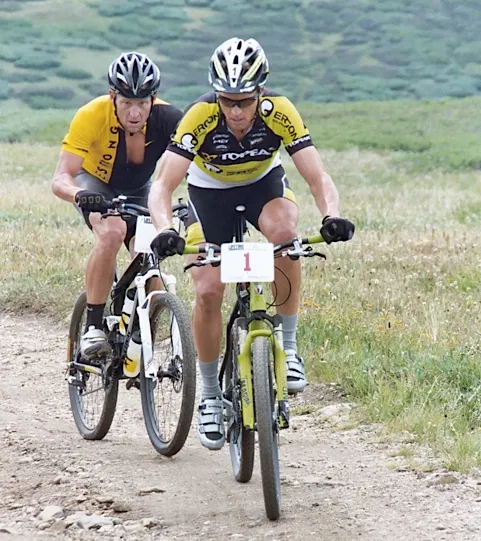
Dave Wiens (R) and Lance Armstrong in the 2008 Leadville 100
Dave, you retired from full-time bike racing in 2004; where does your income come from these days?
Yes, the last year of the Polo-RLX Ralph Lauren team. In football or other sports, one actually retires; it's different for bike racers. The NORBA series was how I defined bike racing up to that point, so I decided it was time to shift my focus.
Now I'm doing a variety of things, one of them for Ergon, who I help promote and also do some racing for throughout the year. Someone could say I'm once again a professional racer, because I'm paid. I signed up with them in 2008. They wanted me to help promote their products at the Outdoor Retailer Show, which coincided with the Leadville 100 race. Lance showed up to race last year, so I decided to race it again.
I also do trail development and consulting. I started a charitable organisation called Gunnison Trails in 2006, and I pour a lot of my energy into that, working closely with the Bureau of Land Management to get trails developed. I help them manage mountain biking initiatives around here, and I help put on the Growler race and other races to benefit Gunnison Trails. Trail and advocacy work probably take up half my time these days. I also coach football and hockey locally.
I don't have an enormous income, but I keep myself busy. Gunnison is a pretty affordable place to live, compared to Aspen or Crested Butte. We don't have an extravagant lifestyle; we're not going hungry. We're pretty isolated in Gunnison, about 70 miles away from any town of comparable size, so we don't shop much. Living here 20-plus years has conditioned us not to be sport shoppers. Susan is actually more careful with money than I am.
How did you become interested in trail development?
My interest in trails came right along with getting interested in mountain biking. I moved to Gunnison after Alaska in 1987. I worked at a restaurant at night and rode my bike during the day. I was racing bikes as an expert, and using the mountain bike as a means to explore public lands around Gunnison. What I found was that there weren't many good trails, if any. Right or wrong, we approached the BLM about creating more trails, which they totally shot down. No reasoning or procedure to follow, just a 'no'.
Back then, one could drive a motorcycle, truck or any other motorised vehicle on the trails, so we took matters into our own hands. A small group of us began building trails, like many systems around the world, including the popular Fruita system. Passionate people built trails, and over time land management agencies took notice. It was an evolution of development, and mountain biking was the driver of all this. In any group of mountain bikers, there's usually a handful of men and women that enjoy building trails. The BLM created rules, and I work closely with them now.
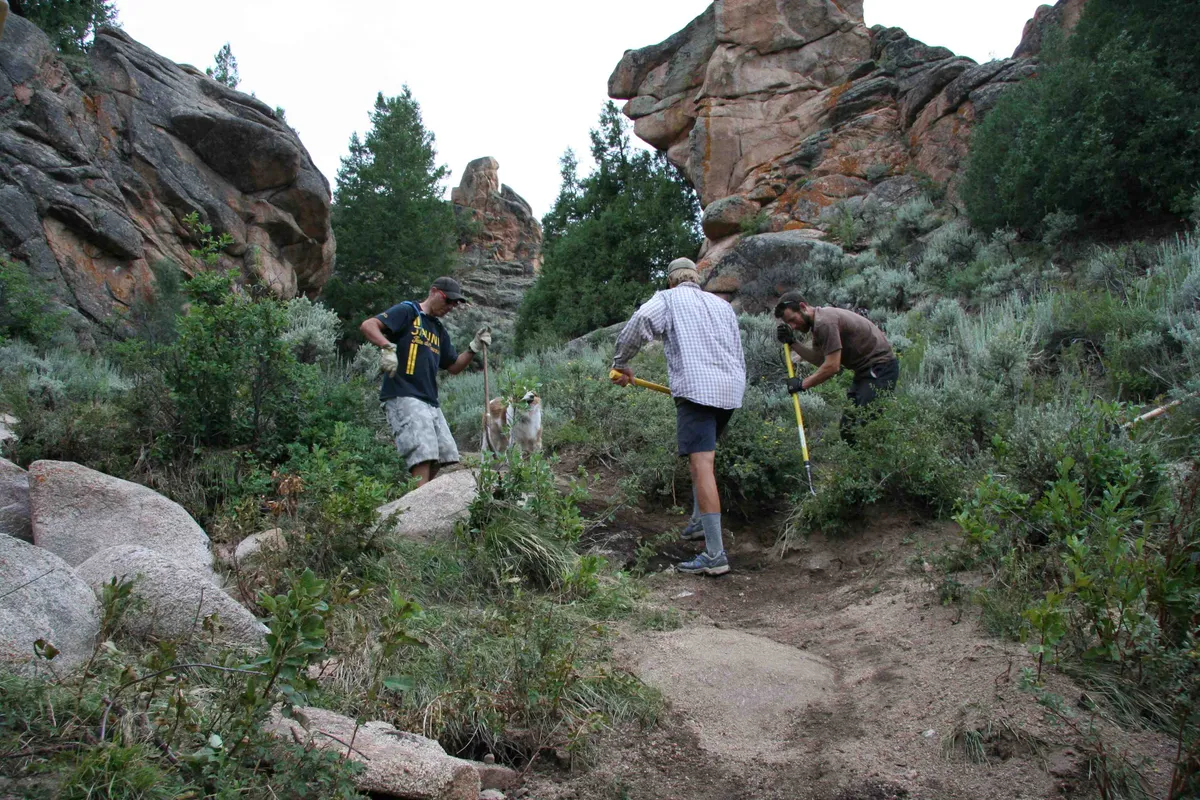
Wiens out on the trails, this time swinging trailbuilding tools
You certainly don't mind rolling your sleeves up and doing the heavy lifting. Who does all your bike wrenching?
I always did, but now with the factor of time, new component technology and a young family, I have my friend and former RLX-Polo Ralph Lauren mechanic Dan Crean help me out with my bikes.
Early in my career, when Susan and I raced in Europe, all we had were our bikes and plane tickets. We had to do all our own wrenching; bikes were more simple then. These days teams have soigneurs, mechanics, managers and a decent-sized staff. We didn't have any of that until much later in our careers.
How did you connect with Rotwild bikes?
My relationship with Ergon USA is obviously connected with Ergon Germany. The team I race for is known as the Topeak-Ergon team, and there's a tight relationship between several German brands, one of them being the bike company Rotwild. Current women's world cross-country champion Irina Kalentieva is on the European team, as are Wolfram Kurschat and Alban Lakata. I'm part of the American team with Jeff Kerkove, Sonya Looney, Yuki Saito and the O'Deas, Eddie and Namrita.
I race the R.R2 HT (hardtail) and usually ride it about three times before Leadville. Other than that, I'm always on the R.R2 FS (full-suspension). At TransAlp, though, I raced the FS. As for race setup: DT Swiss Carbon wheels, Conti Race King 2.2 UST tyres, Stan's sealant, Magura MD80 SL forks, Magura Marta SL disc brakes, Thomson stem and seatpost, Topeak Shuttle carbon cages, Topeak ProPack, Terry carbon rail saddle, Shimano XTR shifters, drivetrain, cranks and pedals.
I don't think any particular bike will make or break someone's ride. If you have trained well, ride smart and have a little bit of good luck, any of those options will achieve your goals. My own preference is a hardtail built up fairly light.
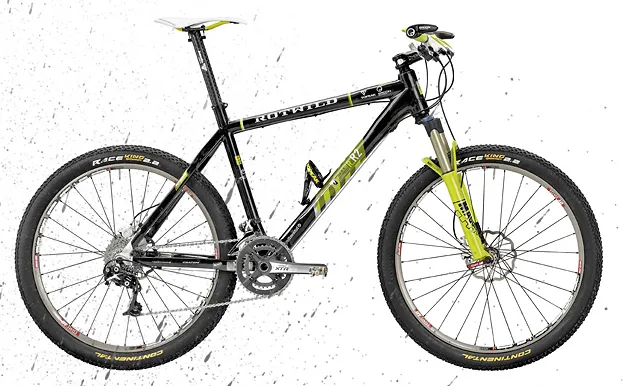
Dave Wiens' Rotwild bike #1, the R.R2 HT
Susan, are you riding a Rotwild as well?
Yes! I just got one a few weeks ago. It's fun; I grew up on hardtails. I'm not a tech person and don't clamour for the latest and lightest, but it's fun to have a full-suspension bike now! I feel like I'm a better bike rider now than I was when I was racing – slower, but a better bike handler thanks to the technology and cushy stuff. It suits my needs perfectly; I don't worry about weight, and comfort is huge for me.
How much mountain bike riding do you do these days, and with whom?
I ride often, usually by myself, but for about an hour or so due to family and work constraints. We have this cool trailhead just 15 minutes away called Hartman Rocks. It's my endorphin fix, my nature fix and my tranquiliser all in one.
Mountain biking is still my favourite sport, and if I'm doing anything social, it's usually on a bike. It's when I get together with girlfriends; I don't meet them for drinks, I meet them for bike rides. I'm still enthralled with riding; we can ride for the better part of the year out here. I think our riding season is over now that winter has arrived.
Describe a perfect day on the bike...
Dave: Riding with Susan, of course, especially in the summer. We don't load our bikes in the car to go on epic rides; we ride adjacent to Gunnison and miles of public land. Another perfect ride is a solo backcountry ride, doing something new and exploring the trails. I also like solo evening rides. Colorado's end-of-the-day light is fantastic. I'll never get tired of it. What started for me as transportation and freedom has come full circle in some ways.
Susan, what's your fondest memory from your racing career, apart from the 1996 Olympics?
That sport afforded me getting out of my little 'box' in Marin County; I hadn't really travelled much before I became a bike racer. The neatest part of the job was meeting a variety of people and traveling around the world, racing internationally. I felt like the luckiest person on the planet, traveling to cool places to do what I loved most. Meeting Dave was a highlight; he was the greatest person I ever met, and racing with the one person I really wanted to spend time with was perfect.
The 1994 World Championships in Vail, Colorado was another highlight for me when I won the silver medal in the cross-country race. There was a good field there, and I didn't expect to place there; my buddy Sara Ballantyne was third. The American women were a force back then; there were eight or 10 really good racers, a stacked deck. Europeans hadn't taken over yet, and they liked racing in the States.
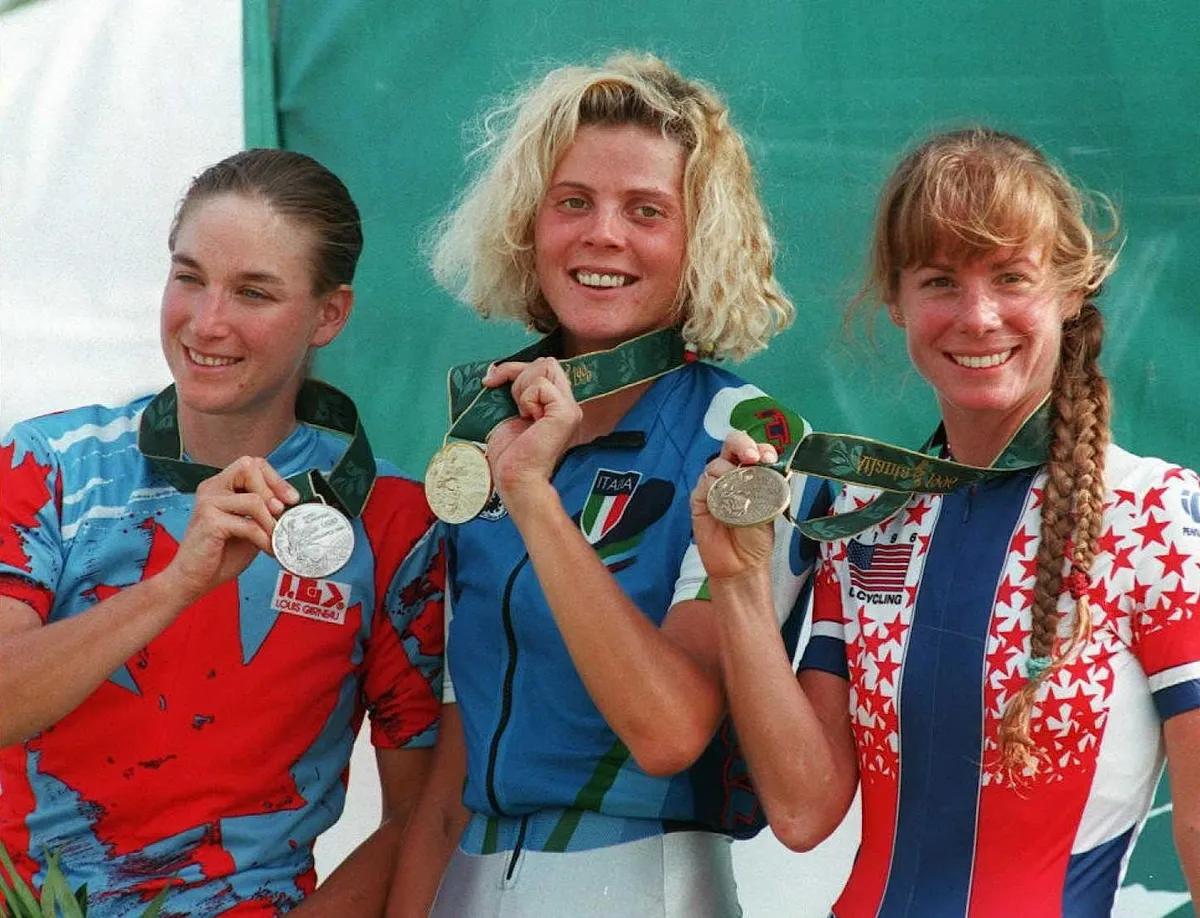
Susan (R) on the 1996 Olympic podium with Alison Sydor (L) and Paola Pezzo
Dave, what was your most poignant and emotional race?
It was the 2008 Leadville 100, because there was so much build-up to it. I would train for an entire year leading up to one race, which I never did racing World Cups, national championships or NORBA races. Last year was more emotional, but Lance was a machine in 2009, coming off the Tour de France. I knew he would win the race unless he broke his bike or had the swine flu. In 2008, he was still among the civilian ranks and put in some decent training, making it a fairly close race. I wasn't any different this year compared to last year, and did the best race I could in 2009. Lance was obviously fitter than me this year!
What's your opinion on the demise of NORBA and US mountain bike racing in general?
Dave: It's too bad, because the series was heavily subsidised. Once the players in USA Cycling changed, the money fell away. The NORBA nationals went back to the early 1980s, the biggest circuit on the planet. I appreciate what other organisers are doing these days but it's not the same. They need a more cohesive series, and I know it's hard to tie in stand-alone events. NORBA was classic in its heyday, up until four or five years ago.
Your average American has lost interest in standard cross-country racing. I think there's a sweet spot in a 50- to 70-mile epic race; 100 miles is pretty tough for most folks. The European 100km off-road marathon races are picking up steam. Riders are looking for a challenge, and a high-quality course makes a difference.
Could the popular gran fondos trigger a similar trend on the dirt? Other former competitors of yours raced Leadville and Downieville this year, including Thomas Frischnecht, Travis Brown and Tinker Juarez...
The essence of our sport is singletrack, and even Lance asked Ken Chouber about increasing the max number of Leadville riders. Trails can't always support that many riders. Our local races are capped below 300 people, even with them always selling out quickly.
I did the recent Livestrong ride in Austin, Texas with Lance and others. Several thousand people participated and it was a compelling event to motivate people to ride. Signing up for an epic event gives people something to aim for.
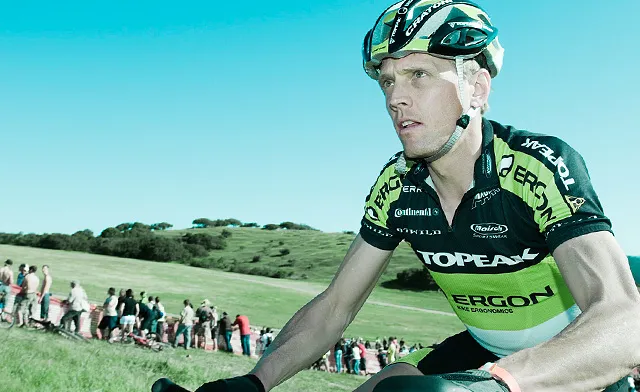
Wiens during the 2009 Sea Otter Classic in Monterey, California
The NorCal High School Racing League has grown into a big deal, especially in Marin County where you grew up. What would a League like that have done for you as a high schooler?
Susan: I'm delighted it exists, and surprised it didn't happen sooner, although I know it takes a huge effort to get something like that going. In fact, mountain biking didn't exist in Marin County when I was in high school, and I didn't play any sports back then. Having mountain biking as an option would've been wonderful.
I started riding and racing mountain bikes in my early 20s; now 10-year-olds are learning skills from their parents on 27-speed bikes. I think it's very cool for the sport. I can't imagine what high school mountain bike racing will do for kids; they're super-lucky. Its time has come, and it suits kids who either haven't found their niche with ball sports or are loners who enjoy riding by themselves.
Dave: I think it's a fantastic sport to have in high school; not every kid is cut out for team sports. It's a lot like cross-country running, where you compete on your own but rely on your team-mates for overall results. Being part of the team and flying the flag of one's school.
High school mountain bike racing offers something to the kids where traditional sports does not. Not every kid wants to play football, basketball, volleyball, whatever. High school mountain biking racing seems very grass-rootsy to me; reminds me of the birth of mountain bike racing in the 1980s. I don't dislike gravity racing, but cross-country racing is simple and something every kid can do.
Tell me about how you'd like to get involved with the newly-formed Colorado Mountain Bike Racing League...
Susan: I'd like to spread the word like others, and would like to see something happen here in Gunnison. There's interest brewing, so it won't be a hard sell here. I think Dave and I could help out doing clinics and promoting the sport; not sure how much hands-on I can do. I love teaching people of all ages. As long as I'm standing upright, I'd love to contribute with some clinics and some talks.
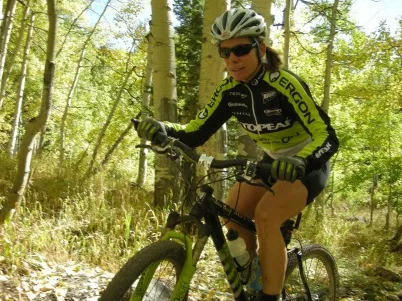
Susan riding on the trails near her Gunnison, Colorado home
Mountain bike pioneers from California and Colorado gathered in the late 1970s to share their new-found passion, so this seems like it's coming full-circle once again. Where do you see high school mountain bike racing heading in Colorado in five years?
Dave: I think it's going to be really big, because we're hearing from friends in Denver and Durango about how excited they are. I think you're going to see Colorado take it and run with high school mountain bike racing. Summit County, Steamboat Springs and others already have leagues, so joining them together will be a big deal.
The competitive aspect of mountain bike races aren't complex; getting the coaches and riders together and practising won't be hard here in Colorado; it's already happening in Durango, for instance.
You and Susan will be the guest speakers at the Colorado High School Racing League fundraising dinner in late April 2010. Excited?
I'm excited to see what the future will bring to Colorado's high school kids. I'm not much of a public speaker, though, so I'm a bit nervous.
Do you think high school mountain bike racing can reach critical mass and become an acceptable school sport in the US?
I don't see why not; it'll take time. Cross-country running is an accepted sport across the US, not super high-profile, but it's a collegiate sport as well. High school mountain biking should follow suit. It'll be hard going up against football and other sports. Smaller schools in smaller towns in Colorado could very well become mountain bike racing powerhouses, with teams from Crested Butte, Gunnison and Durango going toe-to-toe with big suburban schools from Denver. I think that's pretty cool.
This is a sport that will pull from a whole pool of athletes who may not even realise they're athletes. Everybody digs bikes, both boys and girls riding and racing side by side. So many pluses.
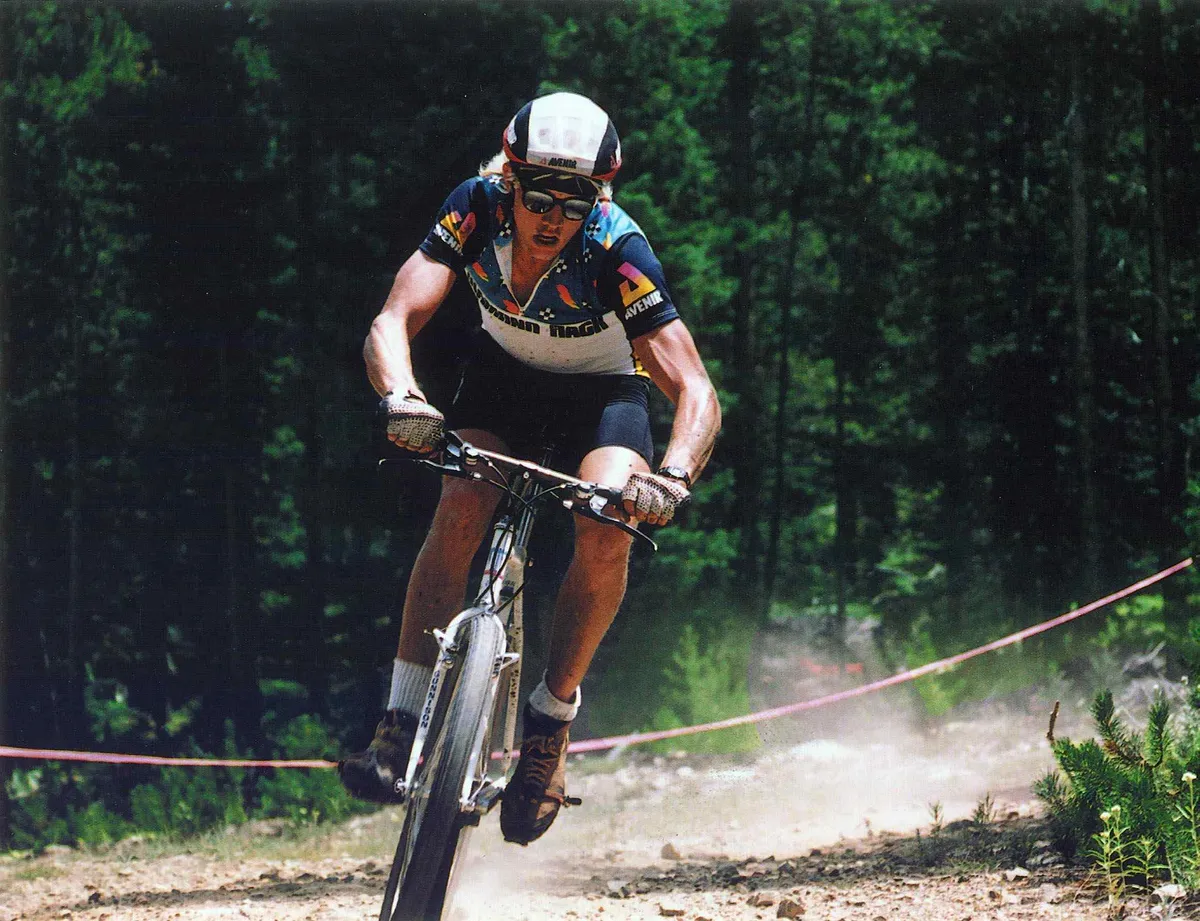
Wiens racing cross-country in the late 1980s
Susan, what can young women do to become professional cyclists, and do they have to choose between dirt and road?
I highly advocate doing both; looking back, I know my mountain biking helped my road racing and vice-versa. I always say do both for the fun, variety and improving strengths. They facilitate the other, especially for high school age kids.
I always wish that kids would be less nervous before the race, and enjoying themselves. Sometimes just committing to a race – signing up – is a big step. Getting time on the bike and practising is a big deal. Setting goals is important, and having fun is what it's about.
I also think the high school racing is good for parents as well as the kids, encouraging people to stay in love with the bike. It's a good way to keep kids challenged, focused and excited.
Do you think your boys will become professional athletes? Look at their parent's DNA!
They're going to be chess champions! They're not particularly taken by the bikes right now. They like a bunch of stuff: hockey, gymnastics, basketball, violin... we're getting them into several different things. I never played sports growing up, and sort of regret that. We're trying to expose our boys to a variety of things.
Dave takes them snowshoeing, Nordic skiing, anything to try and find what they like. We're actually more of an academic family; I'd rather see them bring home a good report card than a BMX race medal (laughs)!
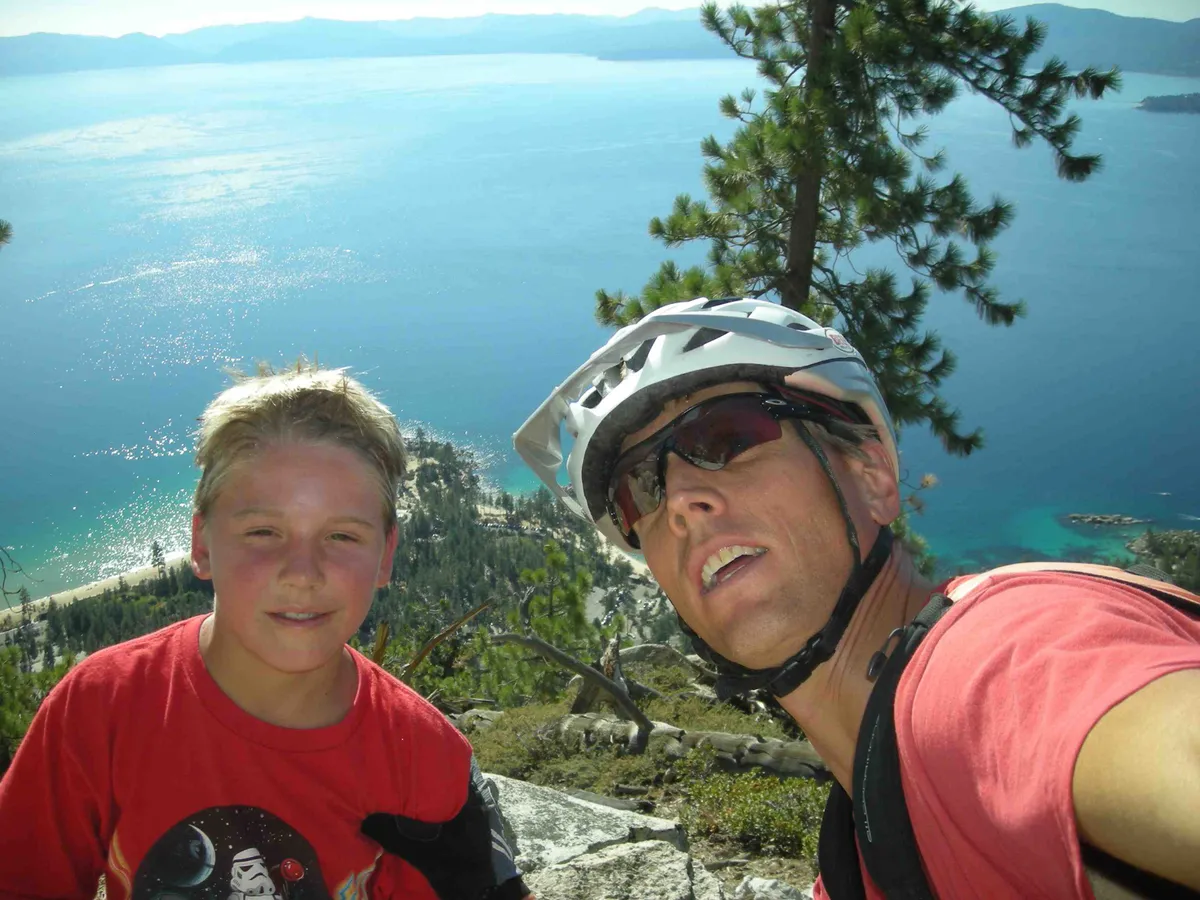
Cooper and his dad enjoying the Flume Trail at Lake Tahoe
How different is the environment your boys are being raised in compared to your own upbringing?
Dave: Quite a bit, actually; small town versus metropolitan Denver where I grew up. The home itself is different; my dad was an 8am-6pm guy, and my job has never been like that. I'm around for my boys quite a bit, and Susan is a part-time nurse. Her schedule also allows her to spend time with the family, because she doesn't have to work shifts at the hospital. My free time in the winter allows me to be home when the kids finish school.
Tell me about how you caught the mountain biking bug.
When I first noticed mountain bikes was in 1984, '85; I was into whitewater kayaking and alpine skiing, and had all my gear for camping and exploring. I had a road bike at the time, but I wasn't a racer. Like many kids I had a Schwinn Varsity growing up.
Mountain bikes were pretty expensive back then. One of the only bikes you could get was a Specialized Stumpjumper for about $700-800, which was beyond my budget. I called it my 'elusive toy'. I wanted one, and knew I'd be into it; used mountain bikes didn't exist.
In the fall of 1985 I was working in a Denver sporting goods store which sold Specialized accessories; a rep sold me a Stumpjumper at cost, which I got at the end of the year. I moved to Jackson Hole, Wyoming to do more skiing, so the Stumpjumper didn't get much use. I really didn't take it on the trail until I moved to Alaska the following summer. I rode it on the Denali National Park trails, but I doubt the trails were legal.
I did my first two mountain bike races in Alaska on cross-country ski trails, an 8km and a 16km during the week. I remember the Nordic trails being super-intense; I recall breaking my seatpost off! I enjoyed it.
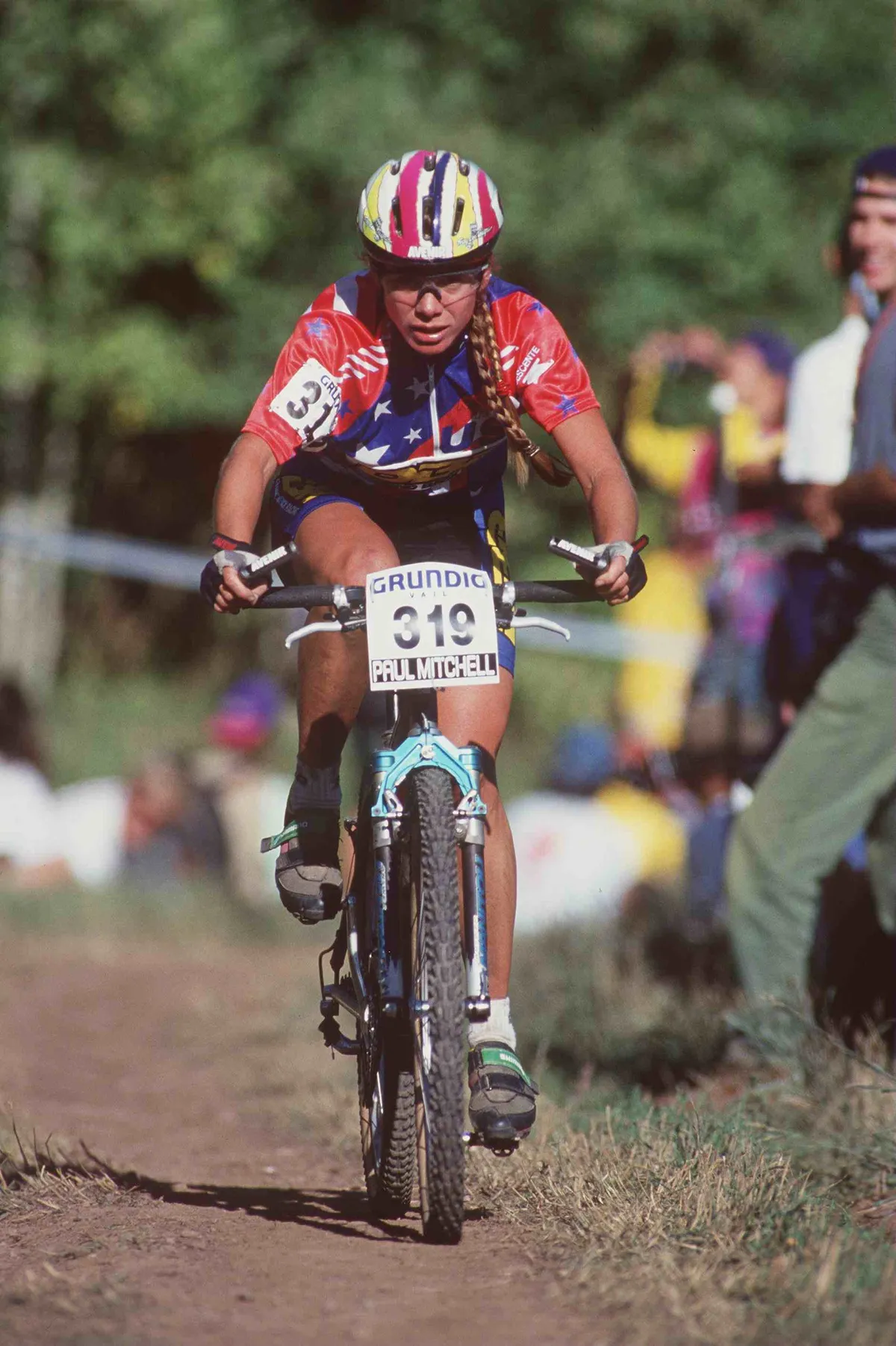
Susan won a silver medal at the 1994 World Champs
Susan, what was bike racing like for women when you first started racing in the 1980s?
It was exciting because it was a new sport; there weren't any defined parametres for women. Fairfax racer Jacquie Phelan made racing fun, relaxing and funny, and I aspired to have her skills. She was a great athlete. At the same time she had this tongue-in-cheek humour about her. She was supportive of any and all women getting involved in mountain bike racing, and paved the way for a lot of people, myself included.
I loved the intensity of mountain bike racing; because there were few women, it was easy to climb the ladder. Most of the races were in California and Colorado back then, in the mid to late 1980s. You could always go to the best races and go against the best competition right away.
When was your first road race?
I went to college in Chico, California, and started racing then and there. The competition was always wonderful, having good role models. I veered toward mountain biking, even though I did more road racing the first couple years. A few women's squads were getting good funding and racing in Europe, and they'd do stage races in California as well. It was a real crescendo for women's racing back then.
How old were you when you decided nursing was your calling?
When I got to college, actually, sometime after my second or third year. I was interested in the sciences. Chico is a very bike-friendly town. I love nursing, and it afforded me the ability to travel when I raced. My dad was a banker and my mom was a housewife; no medical background in my family. I'd like my boys to get into the scientific field, which is wide open.
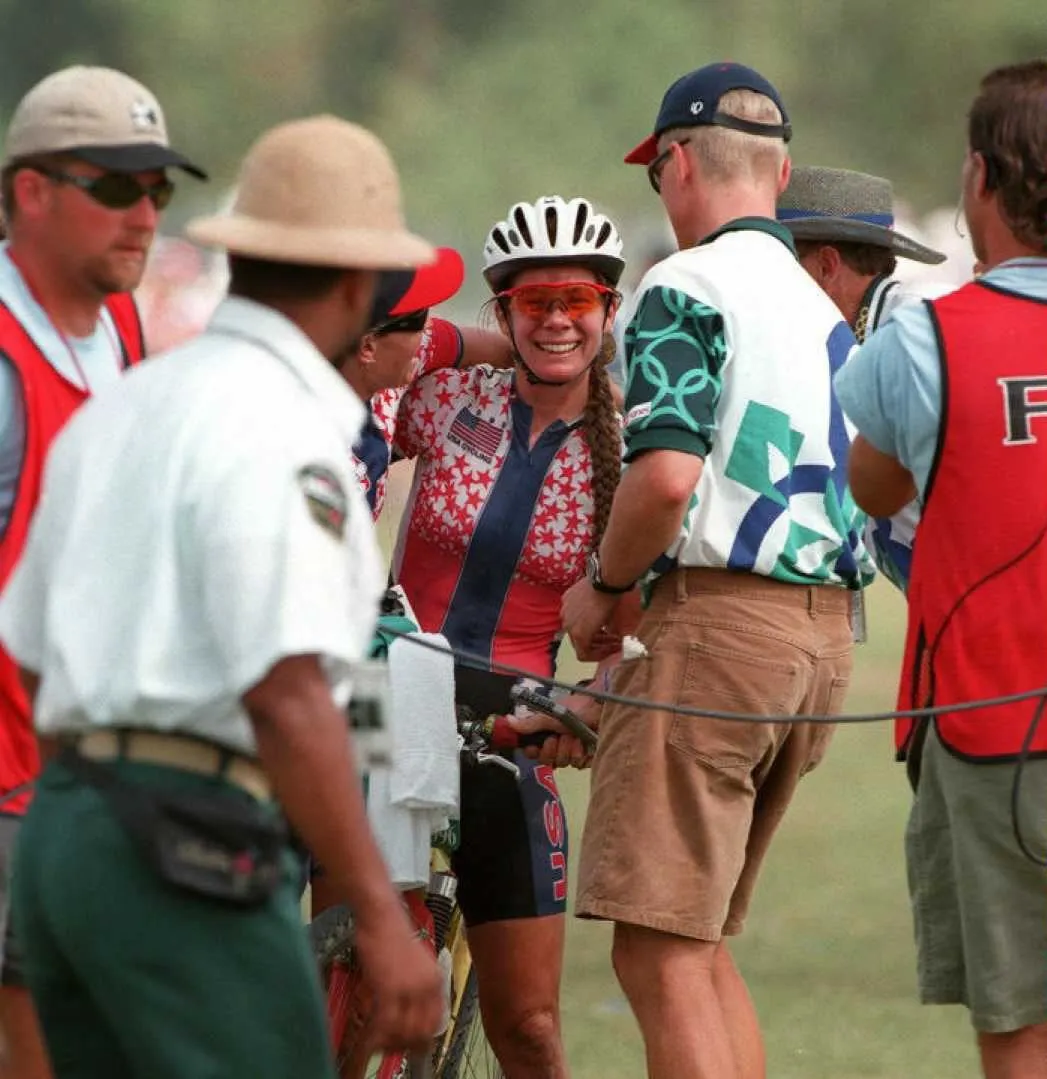
Susan mobbed at the end of the Olympic cross-country race in 1996
You just celebrated 13 years of marriage. How would you describe your relationship?
Susan: It's wonderful; Dave is too good to be true. I have a ridiculous amount of respect for him, and have never met someone with so much integrity. I feel honoured to be with him, and to be his partner. He's the most fair and supportive guy I've known. We try to facilitate each other's lives. We get to spend a lot of time with our kids, and share many of the same goals.
It's also been fun to transition from where we were when we first met to now. Our lifestyle is totally different. It doesn't matter if he wins or loses Leadville; Dave is still the same person either way. I'm lucky, really.
Dave: I count myself lucky; Susan is a great person, friend, and mother. She likes our lifestyle in Gunnison, and enjoys her work with patients at the hospital. I hear feedback from her co-workers, patients and superiors that she's wonderful to work with. Life with Susan is awesome.
Now we're playing hockey together. We play in the recreational league together, putting on the hockey gear and skate the ice together. She was initially skeptical, but enjoys the challenge and fun with our friends.
Susan, what would former team-mates and competitors think of you now as a hockey-playing mom?
(Laughs) Actually, Alison Sydor mentioned she played hockey back when we were rivals. I was the least adventurous of the group; all I wanted to do was ride my bike and monitor my heart rate. Sara Ballantyne ended up doing epic adventure races. At middle age, I'm proud to say I'm finally branching out! Dave and I play on a team together, with people of all ages and from all walks of life. All winter long there are tournaments going on.

